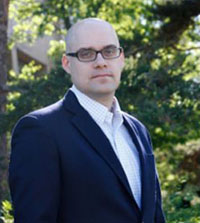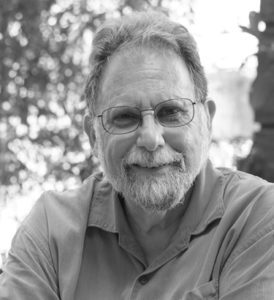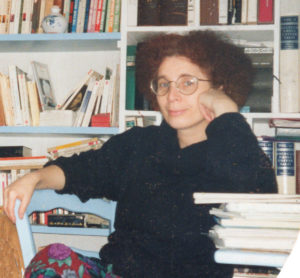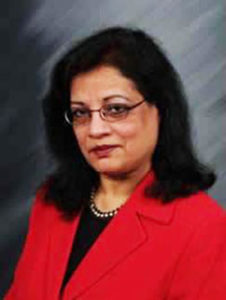Affiliated faculty are active, collaborative researchers and instructors from across the MSU campus who share our vision.
Geri Alumit-Zeldes, Ph.D., is an associate professor in MSU’s School of Journalism who worked with the Knight Center for Environmental Journalism to develop and distribute two films about farming in Flint, Mich.: “The Kings of Flint,” (WKAR-TV, 2011) and “Flint River Farm,” (fall 2013). Coverage ofthe first film that appeared on GreatLakesEcho.org led to subsequent articles in USA Today, the Chicago Tribune, Associated Press, as well as other news outlets. In addition to the Award of Excellence from the Broadcast Education Association, “The Kings of Flint” received a regional Emmy nomination and was awarded in 2012 by the Michigan Association of Broadcasters Best Mini-Doc in Public TV. In February 2010, MSU recognized her with an Excellence in Diversity Award for “Advancing Global Competency.” International communication associations have acknowledged seven manuscripts with best paper distinctions and three of her documentary films with top awards. Email: gerizeldes@gmail.com; Phone: 248-910-0687; website.
John Besley studies how views about decision-makers affect perceptions of new technologies with potential health or environmental impacts. This focus includes consideration of both mediated exposure through newspapers, television programs and web content, as well as face-to-face public engagement exercises (e.g., public meetings). His work emphasizes the need to look at both citizens’ perceptions of decision-makers and decision-makers’ perceptions of the public. More generally, John explores the relationships between media use, public engagement and health and environmental risk perceptions. His research has touched on public perceptions of nanotechnology, biotechnology, and energy technologies (particularly nuclear and hydrogen and fuel cell technologies). He has also been involved in research into journalistic norms related to coverage of public engagement. Email: jbesley@msu.edu
Howard Bossen, PhD, is professor of photography and visual communication in the School of Journalism at Michigan State University and adjunct curator of photography at the Michigan State University Museum. He has been adjunct curator of photography for the Kresge Art Museum and guest curator for the Carnegie Museum of Art. He was a Fulbright scholar in Mexico and a distinguished visiting professor in the Center for the Arts in Society at Carnegie Mellon University. He is the author of Henry Holmes Smith: Man of Light and Luke Swank: Modernist Photographer and co-editor of Detroit Resurgent. His interests include documentary photography, industrially and environmentally focused photography and the intersection of photography and science. Email: bossen@msu.edu
Dr. Manuel Chavez, is Associate Professor at the School of Journalism in Michigan State University (MSU), and Affiliated Core Faculty in the Center for Latin American and Caribbean Studies and the Chicano/Latino Studies Program. He is also Faculty member in the MSU Center for Health and Risk Communication and the Judicial Administration Program. He works on issues related to North American border security, media-government relations, public diplomacy, and crisis communication. As part of the U.S-Mexico border security research, Dr. Chavez has focused his studies on water security and natural resource protection and he co-edited a book highlighting these issues as a national security priority. He has published numerous scholarly articles and books, received U.S. government grants and from private Foundations, and he is the past-President of the Association for Borderlands Studies and past-Head of the International Communication Division of AEJMC. He has been reviewer for the National Science Foundation, International Education USDE competitions, and a judge for peer-reviewed journals. He is a regular analyst for national and international news organizations, including: NPR, ABCradio, Michigan Public Radio, Financial Times, BBC, UNIVISION, and Radio Mil –Enfoque- and Reforma newspapers in Mexico. Research interests: border security, crisis communication, and natural disasters and their impact on the environment, news media environmental reporting. Email: chavezm1@msu.edu
Evelyne Cudel is a transdisciplinary scholar born in France. She obtained a Bachelor of Science in Anthropology with Honors, a Master of Science in Anthropology with Honors, and a Ph.D. in Anthropology at the University of California Riverside (UCR). Her interdisciplinary research thesis was on the social aspect of diabetes type II that includes the ethnohistory of the tribe with traditional agriculture and irrigation system: “High Incidence of Diabetes in the O’odham: Community Approach in Prevention and Control for a Native American Tribe”. Cudel also has Associate Degrees in Science from Riverside City College (California) in Journalism and Photography. Cudel created a number of scientific films including “A World Strategy for Conservation of Natural Resources” in 1992 to promote global conservation. Previously, she was the official photographer for the Riverside Landis Performing Art Center, the leading feature photographer for RCC Viewpoint, an award-winning newspaper, and the official photographer for the UCR Museum of Photography. She is an active member of the Lansing Public Media Center. Cudel is the founder of the Alliance Française “Michigan Capital Area Chapter” and led the group for 20 years. She developed her research and teaching philosophy with a transdisciplinary humanistic approach which is applied to address ethical issues in conservation of natural resources and public health, with an emphasis on the multidimensional context of water. Cudel works with Native American communities, particularly in the areas as it relates to sustainable agriculture and water conservation, as well as the impact of the social environment on watersheds. As an international scholar she developed memorandums of understanding with institutions such as the Museum National d’Histoire Naturelle in Paris, and is active on the board of international organizations. She is a core faculty member of the MSU Water Science Network. Cudel is a Liberty Hyde Bailey Scholar, a visiting curator for anthropology at the University of Michigan (UM) Matthaei Botanical Gardens and Nichols Arboretum and has an affiliation with the Water Center at UM. She is the advisor for the “MSU Philosophy of Nature Club”. She developed a new community approach to theatre and film; this work was published recently in a text celebrating the Centennial of Simone de Beauvoir: “De son art à l’actualité de son éthique : nouveaux espoirs pour Simone de Beauvoir unique expérience théâtrale avec les Bouches Inutiles.” The model is designed to bring people together in addressing the constellation of their environmental leading challenges with an emphasis on water. Among other published contributions to the “Gardens of Science” model are: “Ethnopharmacology of the Sonoran Desert: Food as Medicine in an O’odham Tribe and; “Ethnopharmacology of the Great Lakes Region, Case Studies”. She speaks French (native), English, Spanish and some Ojibwe and Turkish.
Email: cudel@msu.edu
Thomas Dietz is a professor of Sociology and Environmental Science and Policy (ESPP) and assistant vice president for environmental research at Michigan State University. He holds a Ph.D. in ecology from the University of California, Davis, and a bachelor of general studies from Kent State University. At MSU he was founding director of the Environmental Science and Policy Program and associate dean in the Colleges of Social Science, Agriculture and Natural Resources and Natural Science. Dietz is a Fellow of the American Association for the Advancement of Science, and has been awarded the Sustainability Science Award of the Ecological Society of America, the Distinguished Contribution Award of the American Sociological Association Section on Environment, Technology and Society, and the Outstanding Publication Award, also from the American Sociological Association Section on Environment, Technology and Society and the Gerald R. Young Book Award from the Society for Human Ecology. At the National Research Council he has served as chair of the U.S. National Research Council Committee on Human Dimensions of Global Change and the Panel on Public Participation in Environmental Assessment and Decision Making, and currently is vice chair of the Panel on Advancing the Science of Climate Change of the America’s Climate Choices study. Dietz has also served as secretary of Section K (Social, Economic, and Political Sciences) of the American Association for the Advancement of Science and is the former president of the Society for Human Ecology. He has co-authored or co-edited eleven books and more than 100 papers and book chapters. His current research examines the human driving forces of environmental change, environmental values and the interplay between science and democracy in environmental issues. Dietz is an active participant in the Ecological and Cultural Change Studies Group and the Animal Studies Program at MSU. Research interests are in human ecology and cultural evolution. Email: tdietz@msu.edu
Kyle Evered is an historical geographer who has a focus on questions of society-state relations (esp. approaches to & modes of governance) in terms of: (1) environment; (2) identity; & (3) public health. Given these interests, much of my work also draws from research in environmental history & political ecology. Regionally, I am interested broadly in the wider Middle East & post-Soviet Eurasia, though my specific research focus entails a concentration on historical geographies of Ottoman & republican Turkey. Research interests include environmental history, cultural & political ecology, & health & environment. Website , Email: ktevered@msu.edu
Stacey Fox is Transdisciplinary Artist-in-Residence in the School of Journalism. She is also Senior Educational Design Technology Advisor and Lead Artist for the Smithsonian Latino Virtual Museum transmedia project as well as traveling as an artist ambassador representing the United States at the invitation of the U.S. Department of State through their Performing Arts initiative. Her creative and educational projects have been funded by American Composers Forum, Arts International, Doris Duke Charitable Trust, Fulbright-Hays, Gates Foundation, Kauffman Foundation, Walt Disney Company, Knight Foundation, NYFA, NYSCA, National Endowment for the Arts-Challenge America, Kennedy Centers Partners in Education, Institution Museum Library Sciences (IMLS), Rockefeller Foundation, Target Foundation, Smithsonian Institution and the U.S. Department of State. Her works have been created for and experienced in numerous venues including Belarus Philharmonic, National Museum of the American Indian, Omaha Nation Pow wow Celebration, Lewis and Clark Bicentennial, Second Life, Open Sim, St. Marks Church-NYC, Smithsonian Latino Virtual Museum, American Dance Festival, Gifu Performing Arts Center-Japan, Smithsonian American Art Museum, Southwest Dance Festival, National Museum of Natural History, National Museum of Dance, Smithsonian Environmental Research Center, Tang Museum, Skopje Summer Festival – Macedonia, Olympolis Arts Festival Greece. Her research focuses on representing cultures and the environment in new media, 3D interactive immersive simulations for tangential educational use on cultural and environmental (Earth and beyond) issues as well as for public awareness campaigns, journalistic storytelling through 2D and 3D animation, mobile Augmented Reality apps and the Transmedia approach to combining all of these for global dissemination and consumption across multiple platforms. As a classically trained musician she also researches the impact indigenous rhythmic and vocal patterns/frequencies have on the creative and healing processes, sound and its impact on the environment both on Earth and outer space as well as the impact of Chi Kung practices for energy distribution during live performances. Email: sfox@msu.edu
Troy Hale is a 19 time Emmy Award winner and has been nominated over 40 times for his work as a documentary filmmaker, television producer and journalist. Troy has also picked up 6 Telly awards, 6 Worldfest Film Festival awards and 1 CINE Golden Eagle Award, an Edward R. Murrow award, 2 Associated Press awards, 3 National and 10 regional NPPA awards. He has spent the last 15 years in documentary film and broadcasting. He has worked as a documentary filmmaker, producer, Reporter for Press Pass TV out of New York and as an Investigative Journalist with KMSP Fox 9 Television in Minneapolis, MN. Troy has had stops at WSVN Fox 7 in Miami, ABC 6/FOX 28 in Columbus Ohio. ABC 24 in Memphis and NBC 25 in Hagerstown, MD. He began his broadcast career as a Disc. Jockey for WYLI radio. Troy has covered hurricanes, tornadoes, floods, fires, presidential elections, local news, the MTV Video Music Awards, Tyson/Lewis fight, the Big Ten, NBA, NFL, MLB, NHL, MLS and anything else with an abbreviation. His film work has been shown at many film festivals around the country. Troy is known as a creative visual storyteller and a perfectionist. Troy is the Director, Editor and Cinematographer for his own company Tricky Hale Films. Troy also teaches film and broadcast journalism at Michigan State University. Email: halet@msu.edu
Jennifer Olson is a geographer in the College of Communication Arts and Sciences at MSU. Her research interests revolve around the socioeconomic and ecological causes and consequences of environmental change, and information & communications technologies and development. Olson is a co-leader of the Information and Communications Technology for Development (ICT4D) program that is designing ICT technologies for developing countries and installing and testing them in Tanzanian primary and secondary schools. She is the PI or co-PI of international, inter-institutional research projects funded by NSF, USAID and the Rockefeller Foundation examining the impact of climate change on agriculture and rural communities in East and Southern Africa. Olson has over twenty years of living experience in Africa, including while conducting field research in Kenya, Uganda, Tanzania, Rwanda and Zambia, and as a Peace Corps and a U.N. volunteer in rural Burkina Faso, Republic of the Congo and Central African Republic. Research interests include the socioeconomic and ecological causes and consequences of environmental change, and information & communications technologies for development. Email: olsonjj@msu.edu
Amol Pavangadkar is a senior producer and a specialist with MSU’s Department of Telecommunication, Information Studies and Media and the College of Communication Arts and Sciences. He has produced dozens of videos for the Knight Center that help teach journalists how to better report on the environment. His interest in the environment has led to collaborations with scientists, journalists and educators to inform the public about mercury poisoning, recycling, biofuels and bio energy, energy efficiency, climate change, sustainability and waste reduction. With funding from the National Institute of Health (NIH) and United States Department of Agriculture (USDA), he has produced materials to improve nutrition in low income households, with special emphasis on infants and toddlers.
Phil Robertson is an MSU Distinguished Professor of Ecosystem Science in the Department of Plant, Soil, and Microbial Sciences. His work with the Knight Center includes a collaborative efforts for training scientists and journalists how to better communicate climate change issues to the public. Since 1988 he has directed the NSF Long-Term Ecological Research (LTER) Program in Agricultural Ecology at the W.K. Kellogg Biological Station. More here. He is also program leader for sustainability research in the Department of Energy’s Great Lakes Bioenergy Research Center.
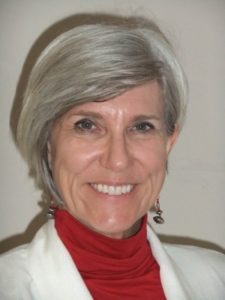
Joan Rose
Joan B. Rose holds MSU’s Homer Nowlin Chair in Water Research and is theco-director of the Center for Advancing Microbial Risk Assessment. She has partnered with the Knight Center for Environmental Journalism on grants to develop materials and workshops to teach reporters to better report on the nearshore ecosystem, to produce nearshore news stories and to produce training videos for water quality technicians. An international expert in water microbiology, water quality and public health safety, she has investigated numerous waterborne outbreaks world-wide and published more than 300 manuscripts. Her work addresses new molecular tools for surveying and mapping water pollution; assessment of innovative water treatment technology for the developed and developing world and use of quantitative microbial risk assessment. More here.
Sandi W. Smith is director of MSU’s Health and Risk Communication Center and a professor in the Department of Communication where she teaches courses in persuasion, interpersonal communication and communication theory. Knight Center graduate students can take courses through the Health and Risk Communication Center and communication students can augment their study through the Knight Center. More about her research interests here.
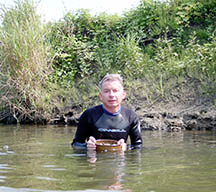
David Strayer
David Strayer is a freshwater ecologist with more than 40 years of experience studying invasive species, conservation of rare species, the biology of freshwater invertebrates, and the ecology and management of the Hudson River. In addition to several books and about 200 peer-reviewed articles and book chapters, he has published several dozen pieces intended for general audiences, which have appeared in the Poughkeepsie Journal, the Albany Times-Union, Ecotone, the New York Times, the Great Lakes Echo, and elsewhere. A Michigan native, Strayer conducted research and taught at the Cary Institute of Ecosystem Studies in New York for 33 years, retiring as a Distinguished Senior Scientist in 2016. He has a B.S. in Zoology from Michigan State University and a Ph.D. in Ecology and Evolutionary Biology from Cornell University.
Dr. Matt Syal serves as a Professor of Construction Management in the School of Planning, Design and Construction at Michigan State University. He is a LEED® accredited professional and received his Ph.D. in Civil Engineering (Construction Engineering and Management) from Penn State University in 1992. Prior to joining the academic world in 1988, he worked as an estimator and project manager for a general contracting firm in the Boston area and earlier, with construction companies in India, Middle East and Africa. Prof. Syal has conducted research and published extensively in the areas of Construction Project Management, Housing, and Sustainable Built Environment. He has been involved in around 50 research/outreach projects funded by the industry, U.S. state and national government agencies, foundations and international agencies. He has published over 100 refereed/professional papers and over 50 project reports/monographs. In addition, he has served as an advisor or consultant to over 25 industry, academic and government organizations in the U.S. and worldwide. Email: syalm@msu.edu
Khalida Zaki, PhD, is assistant professor of sociology, adjunct assistant professor in the Institute of International Health and Fulbright Scholar in higher education. She received her PhD in sociology from MSU, MA in Sociology-Human Ecology from University of Baltimore and BA with Honors in Economics from the University of Punjab in Lahore, Pakistan. She has been a research demographer at the Pakistan Institute of Development Economics and a visiting faculty member at Lahore University of Management Sciences and National University of Sciences and Technology. Her research interests include effective communication and education in journalism, social environment and health, and she specializes in social demography, human ecology and rural and community sociology. Among her research areas are Pakistani-American immigration; Muslim-Americans health care issues; maternal and child health; and Muslim-American youth, parental concerns and schools. Email: zakik@msu.edu
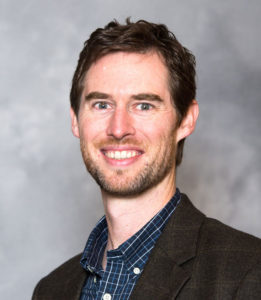 Adam Zwickle conducts interdisciplinary social science research centered on communicating environmental risks and encouraging sustainable behaviors. Drawing from the fields of social psychology and risk communication, his work integrates theories of individual perception and message framing to aide communication practitioners. Specifically, his goal is to better communicate environmental risks in ways that reduce the amount that their long term impacts are discounted. He is also active in sustainability issues at the university level. He has worked with colleagues to develop a valid assessment of sustainability knowledge targeted at undergraduate students, partnered with university sustainability offices to increase conservation behaviors among students. Email: zwicklea@msu.edu
Adam Zwickle conducts interdisciplinary social science research centered on communicating environmental risks and encouraging sustainable behaviors. Drawing from the fields of social psychology and risk communication, his work integrates theories of individual perception and message framing to aide communication practitioners. Specifically, his goal is to better communicate environmental risks in ways that reduce the amount that their long term impacts are discounted. He is also active in sustainability issues at the university level. He has worked with colleagues to develop a valid assessment of sustainability knowledge targeted at undergraduate students, partnered with university sustainability offices to increase conservation behaviors among students. Email: zwicklea@msu.edu


